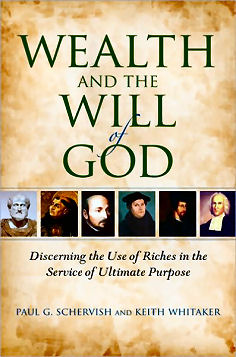
|
Posted June 23, 2010
Book: Wealth and the Will of God: Discerning the use of riches in the service of ultimate purpose Authors: Paul G. Schervish and Keith Whitaker Indiana, University Press. Bloomington, IN. 2010. Pp. 189 An Excerpt from the Jacket:
An Excerpt from the Book: Wealth opens a door for evil, and for good. What matters is that we see wealth as an opportunity, not simply as a predetermined limitation. This point bears on Ignatius’ reflections concerning “spiritual poverty” versus “actual poverty.” Spiritual poverty has to do with attitudes of indifference and humility rather than material goods. It is the stance of one who seeking total dependence on God, “has emptied his or her self of the love of earthly things” and “filled that self with God and his gifts. Spiritual poverty does not necessarily dictate what we should do with our resources; it prepares us to discover what God’s will is for them. Consider the rich young man in the Gospel of Mark. He wished to follow Jesus, but turned away when Jesus told him to sell all that he ahd and give it to the poor. It is because he lacked spiritual poverty that he balked at the thought of actual poverty, not the other way around. Table of Contents: 1. Aristotle: “Being-in-action” and discernment 2. Aquinas: “Distinguish ends and means” 3. Ignatius: All things ordered to service of God 4. Luther: Receiving and sharing God’s gift 5. Calvin: Giving gratitude to God 6. Johathan Edwards: Awakening to benevolence Conclusion: Classical wisdom and contemporary decisions |
|
